How to Search Google When You Dont Know All the Letter
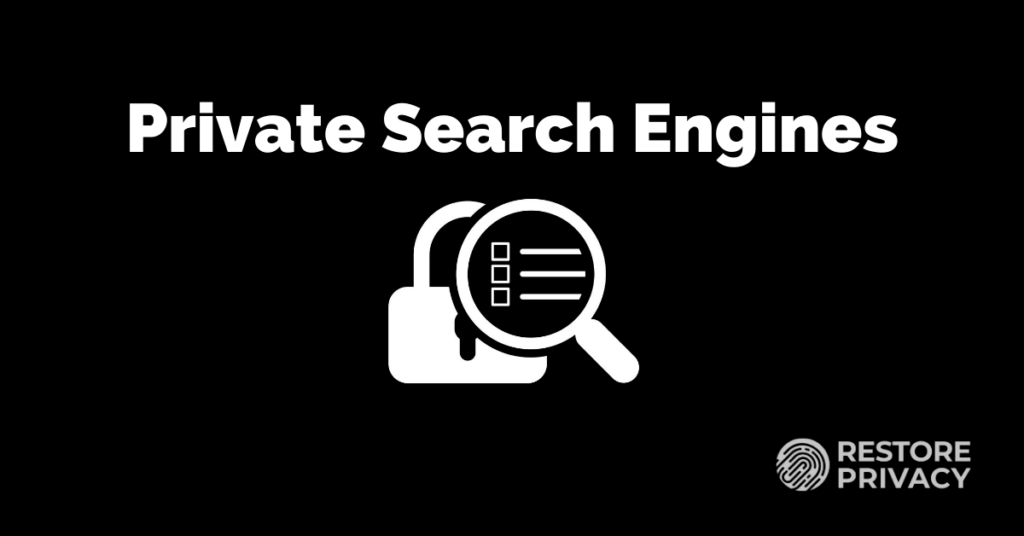
This guide aims to exist the most in-depth resource available on private search engines. For this 2022 update, we examine the all-time private search engines, search results censorship, and how to continue your data condom and secure when searching online.
In today's world, search engines are a necessity to find what yous're looking for online. Unfortunately, nonetheless, at that place are two big problems yous will likely come across:
- Search engines that violate your privacy.
- Search engines that censor search results.
This private search engines guide will thoroughly examine both of these problems and provide y'all with the best reliable solutions and alternatives we tin can discover. So allow'southward brainstorm by examining the first problem with search engine privacy.
The search engine privacy problem
It is sad to say, but nearly of the big search engines today serve every bit data collection tools for ad companies. That's correct, they collect your private information and employ it to make money with targeted ads. This is a booming manufacture where your data ends up in the easily of third parties and you are the product.
Hither is the information being collected past some of the larger (not private) search engines:
- Source IP address
- User agent
- Location
- Unique identifier (stored in browser cookies)
- Search queries
As you may know, the items you lot enter into a search engine tin can disembalm highly personal information nigh yous. Things like every bit medical weather, employment status, financial information, political beliefs, and other private details. This data tin be collected, stored, and linked to detailed digital profiles which can fifty-fifty contain your existent identity. The only way to ensure that your data is safe is to keep it out of the hands of the data collectors. To practise that, you need to utilise a individual search engine.
Search engine censorship in 2022
Many people are getting fed up with online censorship, specially when trying to find specific information that was previously available. Censorship tin take many forms. With search engines today, censorship can come from filtering, manipulating, and/or blocking certain search results from actualization.
Unfortunately, the censorship problem affects many of the private search engines for these two reasons:
- Censorship flows downhill. Many of the alternative and private search engines are nothing more than private proxies that deliver the same search results from the big players. This ways that when Google and Bing (Microsoft) engage in censorship and search result manipulation, so will your alternative search engine that delivers those same results.
- Alternative search engines themselves are also engaging in censorship. Recently the CEO of DuckDuckGo announced that they will "downwards-rank sites associated with Russian disinformation." We can run across both sides to the question of whether or not to appoint in censorship given the geopolitical events of 2022. Nevertheless, this amounts to censorship, which is what many people are trying to avoid.
An exception to this may be with independent search engines that deploy their own crawlers, such as with Mojeek, or Brave Search. Additionally, with Searx, y'all can select which engines information technology uses.
So let'southward examine some culling individual search engines you tin can start using today.
The best individual search engines
Finding the best individual search engine for your needs is a subjective process. Your circumstances and goals are unique, significant at that place'due south no one-size-fits-all. Things to consider include:
- Where is the service based?
- Where does it get its search results?
- Tin yous run your own instance?
In a perfect world, a search engine would give yous corking results while also respecting your privacy. Unfortunately, this isn't a perfect earth. Any of the private search engines in this guide could be the all-time solution for you. But yous volition need to exam drive the ones that look the all-time to you lot to see which is really the all-time fit. Before we start, there is one issue you need to exist enlightened of:
Metasearch vs search: Most individual search engines are technically metasearch engines. While a search engine crawls the internet and gathers its own results, a metasearch engine pulls its search results from other search engines, such every bit Google, Bing, and Yandex.
There are also a few search engines that fall in the heart by deploying their own crawler, but besides pulling results from other search engines.
Note: This list is not necessarily in rank order. Choose the best search engine for yous based on your ain unique needs and threat model.
Hither are the best private search engines:
Searx – Open up source and uncensored search engine

Jurisdiction: Not applicable (open up source, non based in any one location)
Search results: Fully customizable! You can cull from a large pick of engines to display results.
Searx is an open up source metasearch engine that gathers results from other search engines while simultaneously respecting your privacy. Even better, you control which search engines Searx pulls results from, as well as specifying the categories for search results.
Searx customizability comes in handy since Google has been known to block Searx requests. We haven't seen a good solution to the problem, but yous can avoid these kinds of issues past telling Searx to avoid Google (or whatsoever other source that causes bug).
Searx too allows you to run your own example of the search engine. The drawback with your own instance, however, is that your search results won't be mixed with other users. Searx is open up source and available on GitHub.
Be careful if you apply public instances!
Because Searx is open source and freely available for anyone to use, in that location are a number of unlike public instances you tin can utilize. Yet, merely similar with Tor nodes, anyone with bad intentions tin can set up a "rogue" instance and potentially log user activity, as Searx explains here:
What are the consequences of using public instances?
If someone uses a public example, he/she has to trust the administrator of that instance. This means that the user of the public instance does not know whether his/her requests are logged, aggregated and sent or sold to a tertiary party.
Unfortunately the Searx project does not run an official public instance. They do recommend public instances that are operated by various individuals or entities. But how practice you know those instances aren't logging your search results on their server? You lot don't!
For all we know, a public instance might run by an advertising company, or perchance a domestic or foreign intel agencies, or just some creeps looking to spy on your information. The just fashion to be certain is to run your own instance.
https://www.searx.me (gives info almost the project and listing of instances)

Jurisdiction: Germany
Search Results: In our tests, most Megater search results came from Bing, followed by Scopia and Infotiger, another start-upward search engine based in Germany. It also displays some results from Yandex and Yahoo.
MetaGer is an open source metasearch engine based in Frg. It gets search results from Bing, Yandex, Yahoo and others, as well every bit having its own web crawler. This interesting projection started in 1996. Information technology is now operated by a non-profit foundation in Deutschland called SUMA-EV (Clan for Gratis Access to Knowledge). I tested MetaGer for this guide and found the results to be decent, with some nice features equally well:
- Every search result shows the source information technology came from
- Search filter options (date, safe search, and language)
- Proxy viewing options "open anonymously"
- A new News/Politics results type

MetaGer does a proficient job of protecting your privacy, as they explain here. MetaGer converts search requests into bearding queries through a proxy server, which also provides the "open anonymously" viewing option with all results. The service truncates your IP addresses to protect your privacy, although they do pass along user agent info to their search partners. MetaGer does not utilize cookies or any other tracking methods.
For operation stability and security, MetaGer does keep some logs on their ain servers, but this information is kept no longer than 96 hours and is automatically erased. MetaGer finances operations from user donations, as well as ads that are served through partner networks, such as Bing. These ads appear at the summit of the search results. However, you can get completely ad-free search results by signing upwardly for an MetaGer membership. (Without memberships and personal donations, MetaGer states they would not exist able to continue operations.)
MetaGer runs all of its infrastructure on servers in Deutschland, which is a good privacy jurisdiction with strict data protection laws. The service is completely open up source. For those on the Tor network, MetaGer as well hosts a .onion site.
You tin read more about using MetaGer, as well as their apps, plugins, and features, on their website. Nosotros'll shut hither with an interesting quote I found on their site (translated from German):
Did you know that according to the Patriot Act, all internet servers and search engines physically located in the jurisdiction of the United States are obligated to disembalm any information to the intelligence services? Your personal data is at hazard even if the servers and search engines don't store whatever data: it is sufficient if the intelligence agencies read and store everything at the internet point of connection. All MetaGer servers are located in Germany.
https://metager.org/ (English language)
https://metager.de/ (German language)
Mojeek – A crawler-based search engine with more privacy

Jurisdiction: United Kingdom
Search results: Mojeek uses its own crawler and is not dependent on others!
Unlike some of the other individual (meta)search engines, Mojeek is true search engine with its own crawler. According to the Mojeek web log, the service surpassed 4 billion pages indexed in 2021. If you want consummate search independence from the corporate information monoliths of Google and Bing, Mojeek offers an interesting proposition.
In terms of privacy, Mojeek does pretty well. It claims to be the "kickoff e'er no tracking/privacy orientated search engine" from when information technology first started. The Mojeek privacy policy details how user data is generally protected:
Mojeek doesn't implement whatever kind of specific user tracking, whether that be at the fourth dimension of visit or subsequently via standard logs, which Mojeek does keep. These logs contain the time of visit, folio requested, maybe referral information, and located in a split log browser information. IP addresses are not recorded, instead the IP address is replaced with a simple two letter code indicating the visitors land of origin. By doing this, Mojeek removes any possibility of tracking or identifying any particular user.
Hopefully Mojeek can go on to improve their search results and one 24-hour interval rival the big players.
https://www.mojeek.com/
Swisscows – A Switzerland-based private search engine
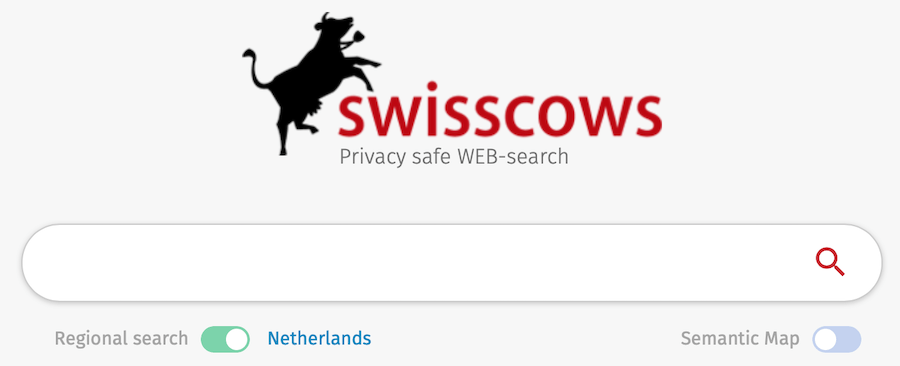
Jurisdiction: Switzerland
Search results: Bing
Swisscows is a Switzerland-based individual search engine that does very well with privacy and security. They promise no tracking or data collection, and even have a "Swiss Fort Knox" data center for their server infrastructure. From their website:
- take our own servers and do not work with cloud or third political party!
- have our Datacenter in the Swiss Alps – THIS is the safest bunker in Europe!
- take positioned everything geographically exterior of EU and United states.
In terms of privacy, Swisscows is one of the height choices. You lot can take hold of up on their privacy policy here. In testing out Swisscows for this guide, I found it to provide expert results, which are primarily sourced from Bing.
Family-Friendly content – 1 unique aspect of Swisscows is that they are passionate virtually family-friendly content. As they explain on their virtually folio:
- We promote moral values.
- We detest violence and pornography.
- We promote digital media teaching.
While some people may not like the fact that Swisscows is censoring some developed content, others may run across this as a great characteristic, especially those who accept young children.
Because Swisscows does not pass on user data from search requests, they are unable to effectively monetize their service through ad partners, which ways they largely rely on donations and sponsorships to maintain operations (sponsors can get a imprint advert at the top of results).
Website: https://swisscows.com
Qwant – A private search engine from French republic
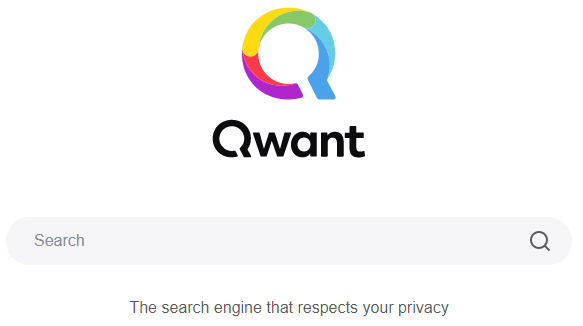
Jurisdiction: France
Search results: Bing
Qwant is a individual search engine based in France. Being based in Europe, information technology is held to data privacy protections that are much stricter than those in the Usa and many other countries. Qwant promises to protect user privacy (no tracking) and keep people from getting stuck in the filter chimera.This is all good since Qwant primarily gets its search results from Microsoft's Bing search engine.
Qwant's privacy policy has changed since we last reviewed their service. Here'due south an excerpt that shows their commitment to protect your privacy:
Qwant is committed to protecting your privacy, and that's at the eye of our philosophy. What yous do with Qwant is your privacy and we don't want to know about it. We don't go along your search history and we don't create an advertisement profile to target you lot. With Qwant, you are of course entitled to the rights guaranteed by the European General Data Protection Regulation of April 27, 2016, known equally the "GDPR", just most chiefly, we ensure maximum respect for the principles of data minimization and "privacy by design", i.east., nosotros implement design methods for our services that allow us to collect and process but the data that is strictly necessary. We never try to find out who you are or what you do personally when you utilise our search engine.
However, when Qwant does non have the answers to your queries, they will pass along pseudonymous information to Microsoft Republic of ireland Operations Express. Microsoft provides search results, along with "contextual advertising based on the keywords you entered and your geographic region."
In addition, for purposes of security and reliability of their partner Microsoft'southward services, Qwant "may also collect and transfer to this partner your full IP address." The data transferred to Microsoft is processed nether the rules of article 6.1.f of the GDPR, and may be retained in accordance with Bing's Privacy Policy for a maximum of 18 months.
While the GDPR should protect your information from corruption by Microsoft, if you don't want Microsoft to know what you are searching for online, you need to exist aware that Qwant may share that data with Microsoft under certain circumstances.
Putting that aside, Qwant has good search filtering options. You tin can filter results by different categories (web, news, social, images, videos, and shopping) too as by dates. The Qwant homepage includes news stories, trending people, events, and other interest stories. According to their website, Qwant serves 189 million results per month.
Overall, Qwant is a good choice for a private search engine, with many features in place to protect user privacy.
https://www.qwant.com/
Brave Search – A new search engine from the Brave browser

Jurisdiction: United States
Search results: Uses its own crawler!
Although it is still in beta, Brave Search looks quite promising. It is brought to you by the makers of Brave, which is a secure browser with congenital-in privacy that runs on open-source Chromium. Different nigh of the other search engines in this guide, Brave is using its own search alphabetize, rather than relying on Bing or Google.
Here is a cursory overview of the Brave Search project from their website:
Brave Search is the world's most complete, independent, private search engine. By integrating Brave Search beta into its browser, Brave offers the commencement all-in-one browser / search culling to the big tech platforms. Brave Search beta is likewise available in other browsers, at search.brave.com.
Given that Brave Search is relatively new, there is non a lot of information regarding the company's policies and practices. Notwithstanding, there is this FAQ folio that answers some questions. We are excited to run into this project develop as it appears to be a strong alternative from a well-regarded organization. We'll proceed an eye on information technology every bit things progress.
https://search.dauntless.com/
DuckDuckGo – Popular private search engine based in the US

Jurisdiction: The states
Search results: Primarily Bing, just at that place are other sources as well.
DuckDuckGo (a.k.a. DDG) is perhaps the about pop private search engine. It'due south popularity has grown greatly since our last review. For many people, the first thing to do when installing a new spider web browser is to set its default search engine to DuckDuckGo.
Based in the United States (non the platonic location from a privacy perspective), DDG was started by Gabriel Weinberg in 2008. It generates search results from over 400 sources including Wikipedia, Bing, and Yahoo. DuckDuckGo has a shut partnership with Yahoo (at present owned by Verizon).
In March 2022, DuckDuckGo fabricated two interesting announcements in the wake of the state of affairs with Russia and Ukraine.
- They volition censor and "down-rank" search results that they experience are related to "disinformation" — meet the Twitter announcement here.
- They volition no longer source search results from Yandex, according to reports.
We're non going to attack DDG for its decision to "down-rank" some websites, because we tin run across both sides of the argument, and this website is not political. However, we will point out that these actions amount to censorship, which DDG previously denounced with other search engines.
To finance operations, DuckDuckGo generates money through advertisements and affiliate programs, which is explained here. Similar to Google and other search engines, DuckDuckGo will display ads at the top of your searches. DDG has partnered with Amazon and eBay as affiliates.
Searches are saved – DuckDuckGo's privacy policy reveals that DDG is saving all your search queries:
We besides salvage searches, but again, not in a personally identifiable way, every bit we exercise not store IP addresses or unique User amanuensis strings. We use amass, non-personal search information to improve things like misspellings.
While it would be great if DDG didn't salve any search information, saving this data without IP addresses or unique User agent strings should protect your privacy just fine.
The history of DuckDuckGo search
In researching the background DuckDuckGo, I uncovered some interesting history. The founder of DDG, Gabriel Weinberg, was also behind a social network chosen Names Database, which collected the real names and addresses of its users. He and so sold Names Database (and all the user information) to Classmates.com for "approximately $10 one thousand thousand in greenbacks" in March 2006.
DuckDuckGo was launched a few years later on, in 2008 and was branded every bit a privacy search engine. Information technology rose to popularity in 2013 following the Snowden revelations. DuckDuckGo remains ane of the about pop private search engines to date and is well-regarded in the privacy community. Even if Mr. Weinberg were to sell DDG some day, assuming the visitor continued to follow existing policies on recording search information, at that place should exist naught to worry about.
https://duckduckgo.com
YaCy – The decentralized, open source, peer-to-peer search engine
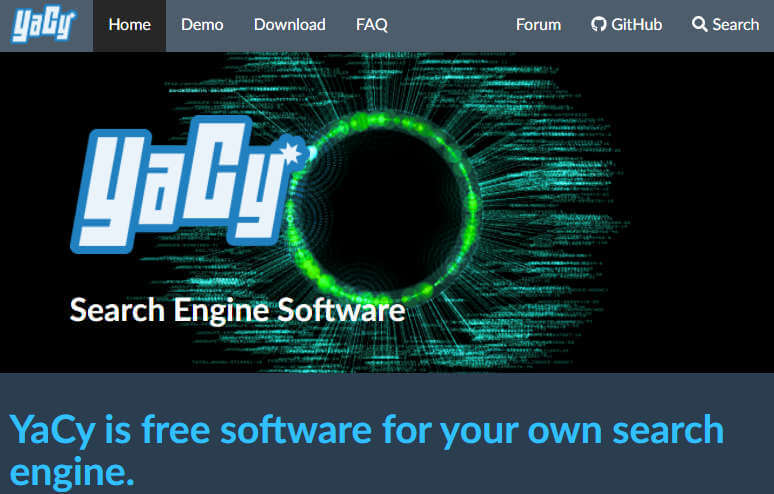
Jurisdiction: Non applicable. (Being a decentralized and open-source platform, YaCy does not appear to fall under any item jurisdiction, similar to Searx.)
Search results: Peer-to-peer crawler model
YaCy is an open source private search engine created in 2004 by Michael Christen. It can run stand-alone or every bit office of a decentralized peer-to-peer network. Here is a brief clarification from YaCy'due south website:
It is fully decentralized, all users of the search engine network are equal, the network does not store user search requests and it is not possible for anyone to conscience the content of the shared alphabetize. We want to achieve freedom of information through a free, distributed web search which is powered by the world'south users.
With YaCy, there is no central server, which could exist seized or tapped by authorities. Rather, all peers in the network are equal and can be used for crawling the web or in "proxy fashion" to index pages for other users. To use YaCy, you need to download the free software on your operating system, available for Windows, Mac OS, and Linux. There is a demo portal hither to test things out.
https://yacy.net/
Ecosia – The search engine that plants trees
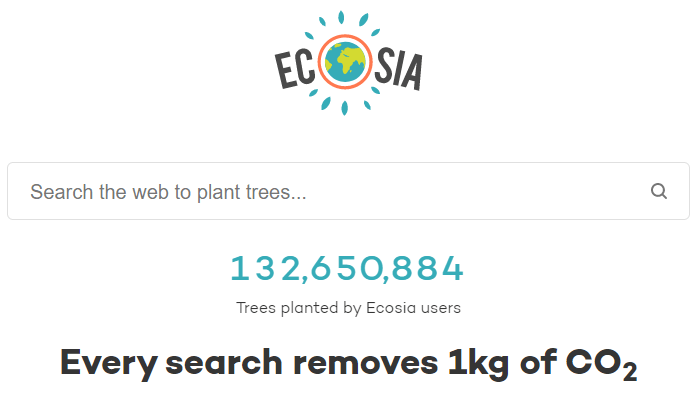
Jurisdiction: Deutschland
Search results: Bing
Ecosia is unique on our list in that it donates a portion of profits to charity and is strictly focused on planting trees. It is based in Germany and claims to be a private search engine. However, some of the things it does brand information technology unsuitable for our master list of truly individual search engines.
One issue is that Ecosia collects all search queries then anonymizes this information later on seven days. Another is that they do a off-white corporeality of data collecting through website analytics, including your IP address, browser agent, location, and more.
And one more thing…
Ecosia assigns a Bing tracking ID to every user:
Ecosia besides assigns a "Bing Client ID" in social club to improve the quality of the search results. This value is a user-specific ID which enables Bing to deliver more relevant search results likewise based on previous searches. The ID is saved in the Ecosia cookie and retrieved during futurity visits.
While the "Bing Client ID" can be manually disabled by the user, most people probably are not even enlightened of it. This is because Ecosia has washed a practiced job burying this information in their privacy policy. To read the total privacy policy, you will need to curl all the way to the bottom of the privacy page, and and then click a light blue "READ MORE" button, which opens upwardly more information.
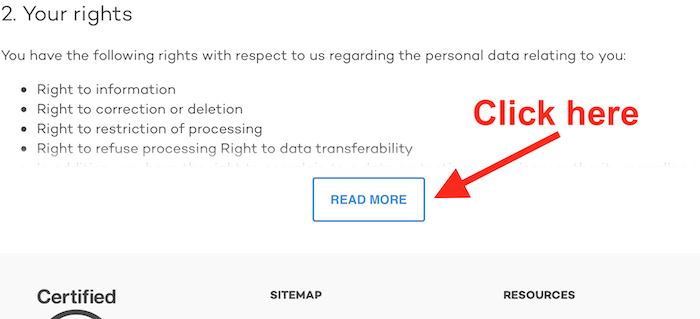
Does Ecosia see the criteria to exist a "private search engine"? Probably not, but it'south still a good alternative to the large search engines, with commendable charity goals.
Main drawbacks:
- Non a "private search engine" by default
- Bing ID is assigned to users (but can be disabled)
- Search queries, with IP accost, are saved for seven days
https://www.ecosia.org/

Disclaimer: Yandex is a Russian search engine that also engages in censorship, as we run across with most Western-based search engines, such every bit Google and Bing. Nonetheless, if there is data that you seek, and Western-focused search engines are of no help, then Yandex.com could be a solution for finding what you demand. Go along with circumspection!
Operating in Russia, we need to bespeak out that Yandex is legally obligated to censor search results. In fact, as nosotros mentioned in our guide on VPNs for Russia, there is massive censorship that is mandated by the government. This is the other side of the censorship coin.
Nosotros have likewise previously pointed out that there is a growing need to unblock websites in Russian federation given all the censorship lately. In fact, Russia has been actively blocking websites since 2012 and the are now blocking major social media sites, including Facebook and Twitter, as well as international news sites, such every bit the BBC.
So why talk over Yandex if they also engage in censorship? Reply: If you can't notice what you're looking for with Western-based search engines, then Yandex may be useful.
https://Yandex.com
Now permit's look at a few search engines that are at least partially owned by advertising companies.
Why is this important to understand?
Because the business model of advertising companies is to collect as much private data as possible. A "private" search engine could exist a massive data collection tool in the incorrect hands.
Tin a fox exist trusted to guard a hen house?
Go on with caution.
1. Search Encrypt – A search engine with some big ruby-red flags
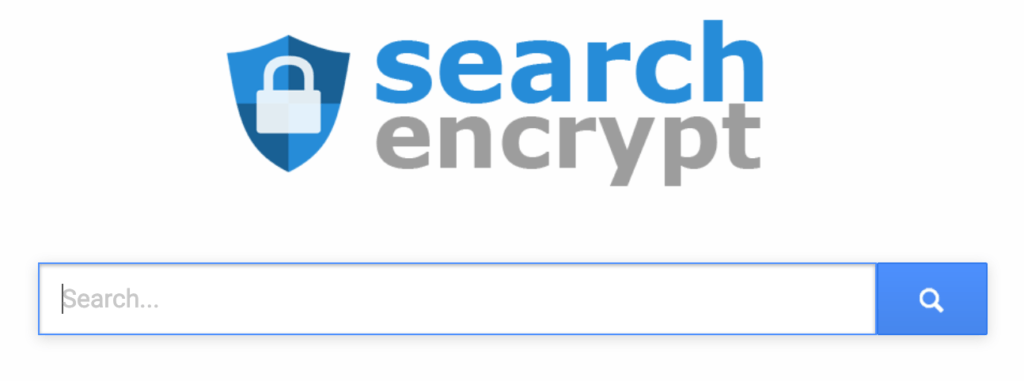
Search Encrypt is another interesting search engine that claims to offer better privacy past default than DuckDuckGo. Like DuckDuckGo, Search Encrypt uses Bing for search results. Search Encrypt describes the post-obit features on its website:
- Expiring browsing history: Encryption keys for your searches expire when you are done searching.
- End-to-end encryption: Searches are end-to-end encrypted using AES-256 and HTTPS/SSL encryption.
- Privacy-friendly maps search
- Privacy-friendly video search
While Search Encrypt does have some interesting features, the privacy policy has a few red flags. Information technology begins with:
Search Encrypt does non track search history in any user identifiable way.
This cryptic sentence suggests that Search Encrypt does indeed rail search history, only attempts to anonymize the data. Their privacy policy further states:
Additionally, we store aggregated search data to improve product performance, merely never store IP addresses or unique user identifiers in connection with such searches in club to ensure that none of the information collected in connexion with your search activeness is personally identifiable.
This is a pretty convoluted statement. Hither are a few takeaways:
- "Aggregated search data" is being logged and stored.
- They claim to not store IP addresses "in connection with such searches" – only this does non hateful that IP addresses are not getting logged and/or passed on to third parties. Rather, they are merely stating that IP addresses will not be associated with searches. Therefore it appears that IP addresses might be getting logged (another reason to use a VPN).
Search Encrypt also discloses in their privacy policy how they may share information with third parties if yous alter the default settings in any way:
In circumstances where you take chosen to alter the default settings, then your personally identifiable data may be shared with third political party site operators.
Lastly, it also appears that Search Encrypt may be operating out of the United States. From their Terms page:
Choice of Law and Venue.
This Agreement shall be interpreted and enforced in all respects under the laws of the Land of Florida, United States as applicable to contracts to exist performed entirely within Florida.
Who's running the bear witness?
Some other question with Search Encrypt is that there isn't much information nearly the company. The contact page shows an address in Cyprus and the legal venue is Florida (United States). The developer for the Search Encrypt Firefox extension (no longer listed) is "SearchIncognito" – with a history of other "private search" extensions:
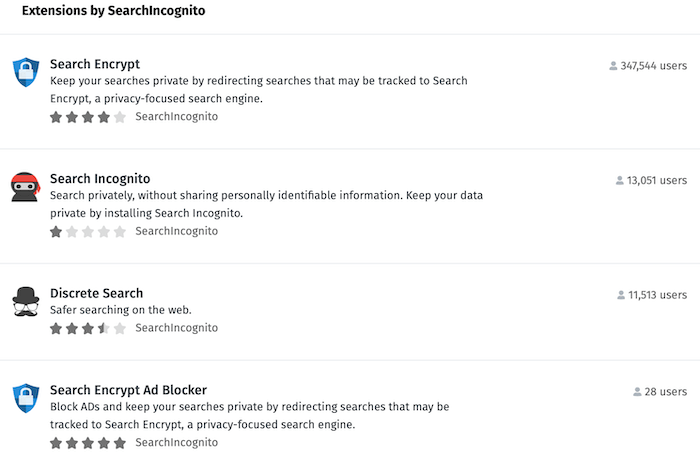
How does Search Encrypt brand money?
Like some other private search engines, Search Encrypt makes coin through affiliates, as they explain here:
In some circumstances, we may append an affiliate code to sure sites linked to our Search Encrypt product, either straight or through search results delivered to yous. In doing then, we may collect a small-scale commission in connectedness with your activeness, but practice non pass any of your personally identifiable data to any such third political party sites.
This of course could be quite assisting with the right deals and enough users. DuckDuckGo likewise utilizes affiliates with Amazon and eBay for revenue, in addition to advertisements. (We'll explain more about how private search engines make money below.)
I reached out to Search Encrypt request for additional clarification on their data collection and user privacy policies. My emails were not answered.
Main drawbacks:
- IP accost and other data may be nerveless
- Data may be shared with third parties if you modify default settings
- Runs on Amazon servers in the U.s.a.
- Non-transparent company
Jurisdiction: Contact address is in Republic of cyprus, legal venue is in the United States (owners in Prc? below)
https://www.searchencrypt.com/
Update: My suspicions proved to be warranted. An article on Medium has revealed that "Search Encrypt" is basically a Chinese information collection tool for ad companies.
How a Chinese Company Congenital a $250 Million Search Hijacking Empire
2. GhostPeek – A clone of Search Encrypt?
It appears that a carbon re-create of Search Encrypt has been unveiled, which they are calling "Ghost Peek" and claim to be another "private search engine".
Someone on reddit did some digging and found the same pattern and ties to Mainland china that we saw above with "Search Encrypt"
Ghostpeek, the supposedly "individual" search engine, is run by a sketchy trounce corporation, which in turn is owned by a personal and mobile data aggregator based in China

Startpage was previously one of my top recommendations for individual search engines. All the same, news surfaced in October 2019 that Startpage was at to the lowest degree partially acquired past System1 and the Privacy I Group. As described in my article on Startpage and System1, there are some concerning factors to consider:
- The fact that System1 has caused a large stake in Startpage.
- The history and business model of System1, which includes gathering "as much data equally possible" and profiling users.
- The lath of directors alter at Surfboard Holding BV (parent company of Startpage), to appoint the System1 co-founder and an outside investor.
- The long delay in alerting the public to these changes.
- The contradictory business models of System1 and a private search engine.
Choosing the best private search engine is largely nearly trust, and only you lot tin can decide who to trust.
Jurisdiction: Netherlands (officially, just at to the lowest degree partially endemic by a U.s. company)
https://world wide web.startpage.com
Private search engine FAQs
Here are some FAQs (frequently asked questions) with regards to private search engines:
- How do private search engines make money?
- Are Usa-based search engines safety?
- How to keep your searches private
- Considerations when choosing a private search engine
How do private search engines make money?
Private search engines make money in three ways: contextual advertisements, affiliates, and donations. Let's examine each of these acquirement streams on their own.
ane. Contextual advertisements
Just like with Google and Bing, many private search engines brand money by placing advertisements in the search results, usually based on the search terms you entered. The difference between private search engines and Google or Bing is that private search engines should but be serving ads based on your search term, rather than from all other data collection sources (email, browsing, etc.).
Notation: Some private search engines pass a truncated (anonymized) version of your IP address to the search partner, in guild to serve relevant ads for your full general location.
2. Affiliate revenue
Many private search engines brand money through affiliate programs. DuckDuckGo is an case of this; they are a member of both the Amazon and eBay affiliate programs:
DuckDuckGo is part of the affiliate programs of the eCommerce websites Amazon and eBay. When you lot visit those sites through DuckDuckGo, including when using !bangs, and subsequently make a purchase, nosotros receive a small commission.
Yous may also run into "online shopping" options to a higher place your search results, which are some other form of affiliate revenue. Both Qwant and DuckDuckGo use affiliate "shopping" results as sources of income.
Note: When y'all buy something through an affiliate link, it never increases the price y'all pay. Rather, it simply transfers a small percentage of the profits (i.eastward. a commission) to the chapter, which in this case is the individual search engine.
3. Donations
Private search engines may also brand money from donations. Anybody tin donate to the projection, regardless of whether it is an individual programmer, a not-turn a profit organization, or a private for-profit business.
If a search engine does not have other sources of revenue or good advertisement deals with partners, donations become very important to ensure continued operations. For instance, Swisscows, MetaGer, and YaCy all take donation options.
Are US-based search engines safe?
Choosing a private search engine is all based on your unique needs and threat model. Therefore a private search engine that Bob considers to be safe, may not be acceptable for Alice.
With regards to US-based search engines, and whatever other U.s. businesses that handles (or has potential access) to individual data, in that location are a few things to keep in mind:
- The U.s. has extensive surveillance programs, which are carried out past various branches of regime, such as the NSA.
- The Us has a long history of working with (and forcing) private tech companies to facilitate bulk data collection efforts – see the PRISM program for details. (This raises questions nearly individual search engines that are existence hosted on Amazon infrastructure, a large Usa-based company.)
- Us companies could be served National Security Letters or other lawful data collection demands, while also existence prohibited from disclosing this due to gag orders.
These laws and capabilities essentially give the US government the dominance to compel a legitimate privacy-focused company to function as a data collection tool for state agencies.

If a privacy-focused business were to exist compromised, it would likely happen backside airtight doors, without a word (or alert) to the users. This was the instance with Lavabit, and rather than comply with the data requests, the founder was basically forced to shut down the business organisation.
Equally a general dominion, RestorePrivacy does not recommend services that are based in the US. Nonetheless, information technology all depends on your threat model and how much privacy and security you lot need.
How to go along your searches individual
Hither are 5 basic tips for keeping your searches (and information in general) more than individual.
i. Use a private search engine
Using one of the private search engines in this guide will aid keep your data safe from third parties. Run across the reviews to determine which private search engine all-time suits your needs.
2. Use a private and secure browser
Merely like with search engines, your browser can also reveal lots of private information about you to third parties:
- Browsing history: all the websites you lot visit
- Login credentials: usernames and passwords
- Cookies and trackers: these are placed on your browser by the sites you visit
- Autofill data: names, addresses, phone numbers, etc.
- Metadata, which can be used for tracking and identification (browser fingerprinting)
Many of the private search engines in this guide offer browser extensions to supplant the default search engine for your browser. DuckDuckGo has even go listed as an alternative search engine for browsers like Firefox and Google Chrome.
See our guide on secure browsers hither.
3. Use a good VPN service
If you use a good VPN service, you won't accept to worry about search engines logging your IP accost and location. A VPN will encrypt your traffic for condom transit across the internet, while likewise replacing your IP accost and location with that of the VPN server you're connected to. There are many other uses for VPN services and they are an of import privacy tool, peculiarly since internet providers in many countries are now collecting browsing history.
Below are my top VPN recommendations:
- NordVPN: A fast, secure, audited VPN with advanced privacy features and a strict no-logs policy, based in Panama (with a 70% discount coupon).
- Surfshark VPN: A no-logs VPN service with a big lineup of privacy and security features, based in Holland.
- ExpressVPN – A reliable, secure, and user-friendly VPN service that is based in the British Virgin Islands with a no-logs policy (audited twice).
And you lot can get more information on our summit recommendations of the best VPN services here.
A reliable ad blocker is another important privacy tool since ads accept get a major threat to your privacy. Many ads now quietly collect data for third-political party advertising networks. Other ads (known as malvertising), actually install malware on your computer or mobile device. The best thing to practice these days is to simply block ads and tracking networks.
There are of form many other privacy tools to consider. Even so, a proficient private search engine, a secure browser, a reliable VPN, and a safe ad blocker are the height priorities for basic digital cocky defence.
v. Log out!
Lastly, whenever possible, stay logged out of Big Tech accounts (Gmail, YouTube, Amazon, etc.) when surfing the spider web, since their trackers will record your browsing action and link this to your data profile.
Another option is to utilise ane browser for staying logged into various accounts, but then use a separate browser for general browsing activity (this is known as browser compartmentalization).
Considerations when choosing a private search engine
Here are some things to consider when looking for the best search engine for privacy:
- Search results – Some search engines may do well in the privacy category, but they don't render very proficient results. Some will actively appoint in censorship, or brandish censored search results from Google or Bing.
- Privacy – Consider what information the search engine is logging, as well as the information that may be passed off to third parties and search partners (such as Bing).
- Jurisdiction – Jurisdiction is an important factor to consider because information technology ultimately affects your data and privacy. Services based in the US, for case, are subject to the Patriot Act, National Security Letters, and may also be forced to collect user data without existence allowed to disclose anything (due to gag orders).
- Features – Some private search engines offer useful features, such as anonymous viewing (via proxy servers), search result filtering options, plugins, extensions, and more than.
- Mobile apps – More than a twelvemonth ago, Google reported that they process more search requests from mobile devices than they do from desktops. We alive on our mobile devices, so a search engine that offers a mobile app for your specific device could exist a big benefit.
- Trust – Trust is difficult to quantify and measure, but it's a very important consideration. When considering the trust factor, yous may want to look at the history of the company and the individuals behind information technology.
Finding the best search engine for your needs is a subjective process, and there's no single "best private search engine" that applies to anybody. Check out our reviews, the test drive a few different options to find the best fit for you.
This individual search engines guide was final updated on March 10, 2022.
vansicklethestive.blogspot.com
Source: https://restoreprivacy.com/private-search-engine/
Publicar un comentario for "How to Search Google When You Dont Know All the Letter"